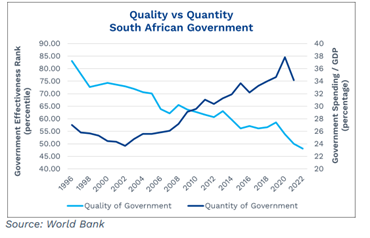The Appropriation Bill has been passed by both houses of Parliament and is awaiting the President’s signature. The bill determines exactly how taxpayers’ money is spent, from grants to non-profits to spending on education, healthcare and social assistance. Without the R1.1 trillion spending, South Africa could come to a standstill.
The passage of the Appropriation Bill is fitting, because this week, the IRR launches the fourth paper in its #WhatSACanBe series, Public Finance: Revitalise Investment, Create Jobs. The paper proposes that the Government of National Unity (GNU) should impose strict fiscal discipline, implement pro-growth policies that can help create an environment for investment to create jobs to achieve economic growth, and most importantly, reduce the public debt which remains a threat to South Africa’s fiscal stability. And South Africa has done this before: between 2003 and 2008, GDP grew by an average of 5% per annum, creating 2 million jobs, while also slashing debt.
A core achievement for the GNU would be to achieve another primary budget surplus, as it did in the 2023/24 financial year. It is concerning that National Treasury proposes tax increases that will boost revenue by R15 billion for this year.
Ordinary South Africans, businesses, and domestic and foreign investors cannot afford more tax increases. With the price of electricity skyrocketing, infrastructure under strain, crime out of control and transport networks crumbling before our eyes, these factors act like invisible taxes that pummel South Africans, shut businesses down, and scare away potential investors.
But National Treasury maintains that the 2024 budget “strikes a careful balance between fiscal consolidation and development.”
There is one question that should go through every tax-paying South African’s mind (including those who pay VAT): “Am I getting value-for-money?”
The short answer: No.

The government’s debt, mentioned 417 times in the 2024 Budget Review, has reached R5.2 trillion as of 2023/24.
If my calculations are correct, based on this explainer, the government’s debt is equivalent to every single one of the 63 million South Africans being on the hook for R82 000.
And to put one line item of government spending into context and illustrate better value-for-money, the GNU could repurpose the R300 million it has appropriated for an “Employment Creation Facilitation Fund” for the following:
- It would give 18 750 South African pupils the opportunity to access any school of their parents’ choice;
- It would cover the cost of school shoes for 1.3 million pupils, working on an average of R225/pair;
- It could mean an additional 7 031 teachers;
- It could give an R7 680 bonus to 39 061 teachers;
- It could build 3 750 RDP houses at R80 000/unit; and
- It could build 2 727 BNG houses at R110 000/unit.
The Fund will be fruitless and wasteful expenditure if it does not meaningfully address unemployment or contribute to substantial increases in skills and sustainable job creation.
This is just the start of what government can be spending taxpayers’ money on. A higher rate of growth means more investment, more jobs, and ultimately more taxes which are better spent on #WhatSACanBe.
Investment – Solution to the problem.
National Treasury’s 2024 Budget Review highlights constraints that investors have been warning about for years. The low Gross Fixed Capital Formation (GFCF) rate, the Treasury notes, is “due to challenging business conditions including high borrowing costs and low confidence”.
This sounds like a typical problem statement. So, what is the Government of National Unity going to do about it?
The IRR has the solutions in our Blueprint for Growth and #WhatSACanBe series. To get South Africa back on track and empower those left behind by pro-poor policies like Black Economic Empowerment and the national minimum wage, to grow the economy, incentive investment, and upskill South Africans: all this is key to future prosperity.
I’m not writing this (and nor did I write my other op-eds) because it sounds nice, upbeat or happy, but because South Africans have a vested interest not only in their individual success, but the collective societal success as well.
Getting people into a job is not something that just sounds nice. It is what South Africans need. Feeding families and ensuring their prosperity can only be done through economic policies that are proven to work:
- Increasing direct investment by scrapping the threat to property rights;
- Maintaining and expanding infrastructure by cutting preferential procurement to ensure value-for-money, and allowing public-private partnerships;
- Drawing millions of people into the labour market by reforming onerous labour legislation, and reviving South Africa’s agricultural, mining and tourism sectors bolstered by the interventions listed above; and
- Implementing effective empowerment policies that do not use race as a proxy for disadvantage. The IRR proposes that government implement its socio-economically based Economic Empowerment for the Disadvantaged (EED).
“Cyril’s economy” shouldn’t be the go-to phrase for complaints about the dismal unemployment rate and the cost-of-living crisis.
It should be a sign of success. The economy under Thabo Mbeki put more South Africans into jobs than any other time in democratic South Africa. The GNU should work to make South Africa the gateway to African prosperity and the gateway to showing the world #WhatSACanBe.
No more looting sprees, please
As a society, we’ve condemned corruption, and hate to see it rear its ugly head, because the people who control that monster are the ones stealing from the mouths of the poor.
State Capture stole R50 billion from all South Africans. When it means the difference between a modern toilet and a pit toilet, the difference between clean water and cholera-infested water, the difference between walking 15 km for a tap and having a tap in one’s back yard, the true cost of corruption reveals a battered and bruised South Africa on the verge of death.
These South Africans are the people that need the government. These people need their social grants to avoid death. These are the people willing to risk life and death for their families. The Public Finance #WhatSACanBe paper is clear: do not cut social grants. Improve South Africa’s fiscal situation by incentivising growth with secure property rights, pro-growth policies and abandoning pro-poverty policies like BEE and NHI.
National growth, local prosperity
I’m reminded of a short interaction I had with a farmworker in Swellendam a few years ago. While walking in the street, he stopped me. He told me that I needed to work hard. Hard enough not to end up like him, or his son, who had fallen into the trap of drugs and crime.
These are the people that will benefit from the opportunities that a growing national economy can bring to small-town and urban South Africa. These include developing skills for the unemployed and those fortunate enough to have jobs, giving them a foothold and a boost up on the ladder to prosperity.
The ANC has consistently been mentioning its “mandate” from the people. Other GNU partners have too. The collective will to change the country is evident. Let’s use it for good.
It is time to put that mandate to work and give us, the people, what we want: growth and jobs.
If you like what you have just read, support the Daily Friend

